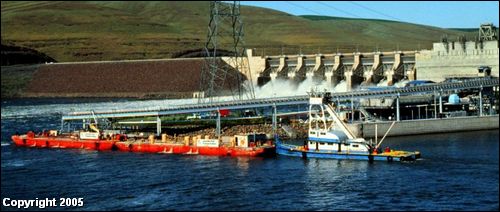forum
library
tutorial
contact

Judge Orders
More Water for Salmon
by Rocky Barker
The Idaho Statesman, June 11, 2005
|
the film forum library tutorial contact |

|
Judge Orders
by Rocky Barker
|
BPA expects to lose $67 million for electricity
 PORTLAND -- Federal dam managers must help endangered salmon pass Snake and Columbia River dams beginning this month by spilling water over the dams that will cost Northwest electric ratepayers tens of millions, a judge ordered Friday.
PORTLAND -- Federal dam managers must help endangered salmon pass Snake and Columbia River dams beginning this month by spilling water over the dams that will cost Northwest electric ratepayers tens of millions, a judge ordered Friday.
U.S. District Judge James Redden granted part of a request from environmentalists, fishing groups and Indian tribes to take immediate steps to aid salmon. Redden told lawyers for the states, federal agencies, farmers and electric customers they all need to be involved in talks aimed at developing a permanent salmon plan that meets the Endangered Species Act and guarantees that struggling salmon populations recover.
"This is not an insoluble problem," Redden said. "I think I'm going to have to get help from the agencies and the plaintiffs. You are the people who are going to have to do it."
On May 26, Redden struck down the Bush administration's plan for protecting salmon and operating 14 hydroelectric dams in the Columbia Basin. On Friday, Redden called that plan "more cynicism than sincerity."
Spilling water through the spillways of dams helps direct the fish away from the hydropower turbines that kill fish or stun them so they are vulnerable to predators.
Federal dam managers don't like spilling the water because that water then cannot be used to generate electricity. Instead, they prefer to collect the salmon on barges and ship them through the dams to the mouth of the Columbia.
Redden ordered water spilled at Lower Granite, Little Goose and Lower Monumental dams on the Snake River in Washington beginning June 20 and McNary Dam on the Columbia July 1.
Redden's order to increase spill means that fewer fish will have to be barged.
The spilled water will result in a loss of $67 million in revenue for the Bonneville Power Administration, which markets electricity produced at the dams, said BPA Administrator Steve Wright.
That won't cost Idaho Power Co. customers, but it will affect the bills of about 20 percent of Idaho residents who get their power from rural cooperatives in Idaho and from the city of Idaho Falls.
Redden rejected a request from salmon advocates that could have had a much more direct effect on Idaho: increasing flows in the Snake and Columbia rivers by drawing down the reservoirs behind the dams and taking more water from Idaho reservoirs.
But Idaho may face new claims to its water to protect salmon. Todd True, an attorney for the environmental and fishing groups, said in court Friday that a plan for operating Upper Snake basin dams on the Snake, Boise and Payette rivers in Idaho relies on the same flawed assumptions Redden rejected in striking down the Columbia Basin dam plan.
True said the groups intend to file a lawsuit challenging the Snake River management plan.
That could put the recently approved Nez Perce Agreement in jeopardy. The agreement between the Nez Perce tribe, the state of Idaho and irrigators set a limit of 487,000 acre-feet of water that can be drained from southern Idaho reservoirs to aid salmon.
But the agreement allows far less to be sent downriver in drought years like this one. In fact, in their request to the judge, salmon advocates asked Redden to order only 343,000 acre-feet to aid salmon this year.
"If you need water to ensure the survival of endangered salmon, Idaho water law and a state agreement don't matter," True said.
Still, True said, he and other salmon advocates are ready to talk with the state, the tribe and the federal agencies about the issue.
Federal officials have been meeting privately with representatives of the governors of Idaho, Oregon, Washington and Montana in talks they told Redden on Friday were promising for developing a long-term salmon plan that could replace the rejected Bush plan. They provided no details, but said they have a "framework" for agreement and asked Redden to accept their summer operations plan that proposed minimal spill and minor changes to the current plan.
Redden rejected the federal-state proposal, but urged the governments to involve the salmon advocates in their talks.
"We were making progress, but we ran out of time" before Friday's hearing, said Robert Lohn, Pacific Northwest director of the National Marine Fisheries Service, also known as NOAA Fisheries.
The federal agencies will continue the talks and attempt to bring in the tribes and eventually the environmentalists and fishing groups, Lohn said.
U.S. Department of Justice attorney Fred Disheroon said the Bush administration is considering whether to appeal Redden's decision. If the government loses on appeal, he said, it might ask for the presidentially appointed Endangered Species Committee, also known as the God Squad. The panel is so nicknamed because it could rule that there are no feasible alternatives for dam operations and exempt them from the dictates of the Endangered Species Act.
Redden said he was not fearful of an appeal. "You win some, you lose some," he said. But he said he was doubtful federal agencies would find sanctuary in the God Squad.
"Even the God Squad must find there aren't any other alternatives, and I'm saying there are many alternatives," Redden said.
learn more on topics covered in the film
see the video
read the script
learn the songs
discussion forum
